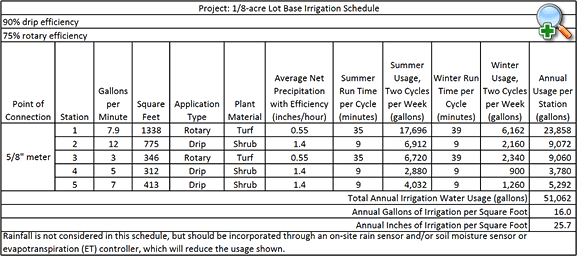Operation and scheduling
- Home
- /
- Operation and scheduling
The majority of the Florida Water Star efficiency practices in the General Design and Distribution Uniformity sections focus on optimizing an irrigation system’s physical delivery of water.
This section of efficiency practices focuses on maximizing the accuracy of an irrigation schedule’s delivery of water based upon the actual plant water requirement in the soil. Three main factors affect the amount of water that is available to a plant:
- The amount of plant-available water that is lost, or the evapotranspiration rate. More specifically, evapotranspiration is the “combination of water transpired from vegetation and evaporated from the soil and plant surfaces” (American Society of Agricultural and Biological Engineers [ASAE], 1998).
- The amount of water that is gained, or effective rainfall, which is the “portion of total rainfall which becomes available for plant growth” (ASAE, 1998).
- The soil’s water holding capacity, which is the “total amount of water held in the soil per increment of depth” (National Resources Conservation Service). Water holding capacity is lowest in sandy soils, which are common in Florida, and highest in clay soils.
Mandatory lawn-watering restrictions have been in effect in most areas of the state for more than 10 years. These requirements must be adhered to in any Florida Water Star irrigation schedule. For specific information about these restrictions for your region, refer to the following water management district websites:
- St. Johns River Water Management District
- South Florida Water Management District
- Southwest Florida Water Management District
Plant water requirement varies from month to month. As a result, in some locations it might be necessary to have two schedules, one for one-day-per-week irrigation and one for two-day-per-week irrigation.
Operation and scheduling practices should be a major consideration of any irrigation system that is designed for water efficiency. This efficiency practice category includes the following:

